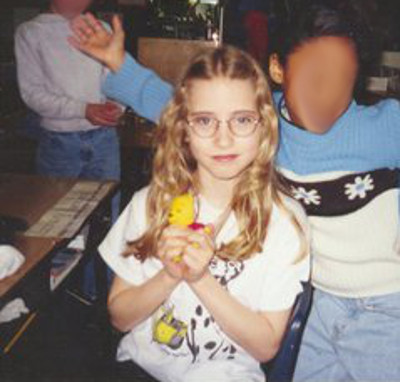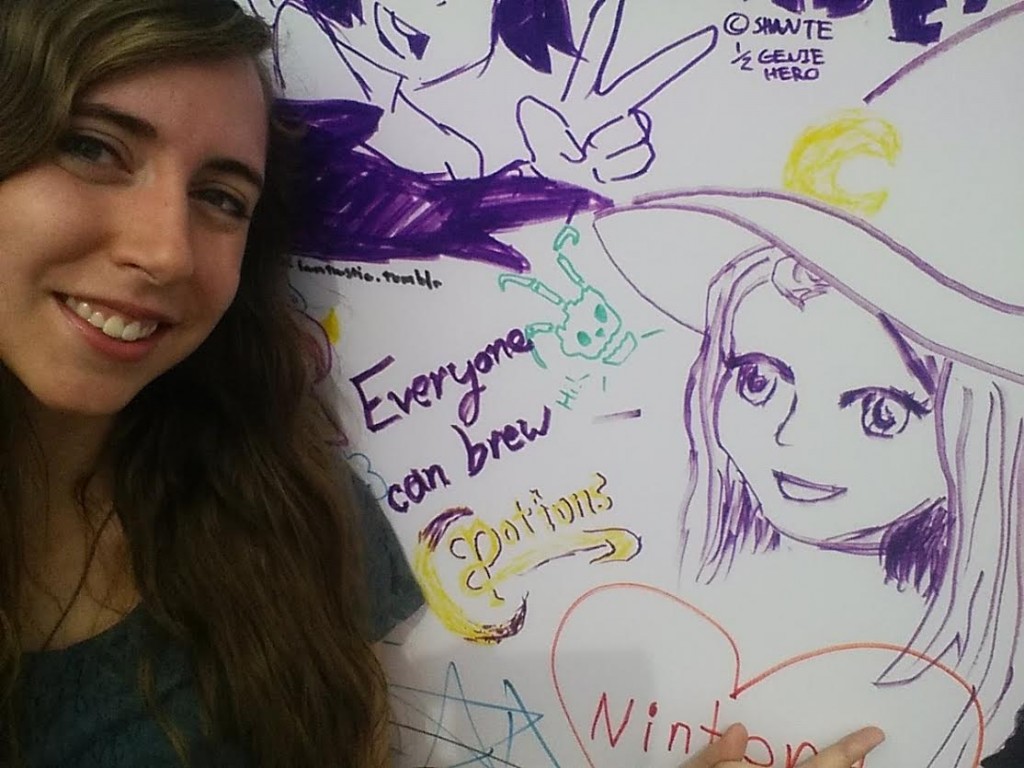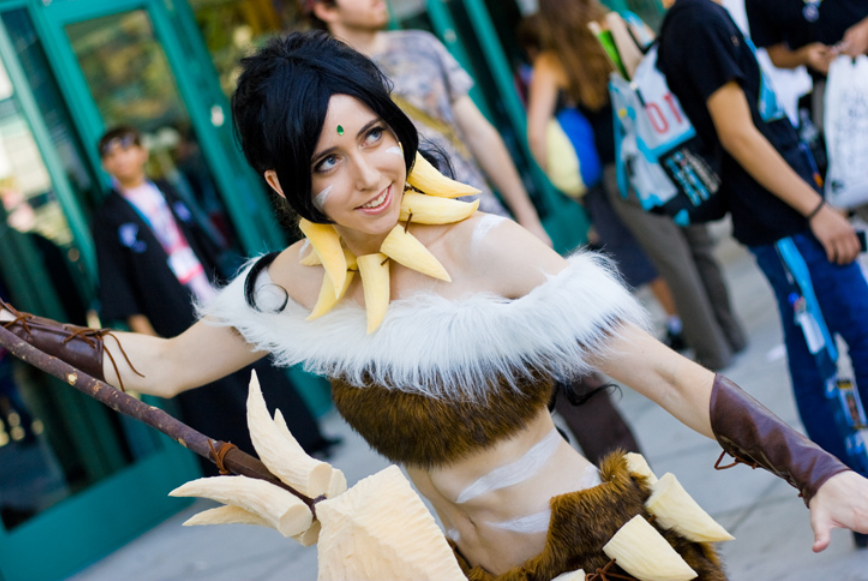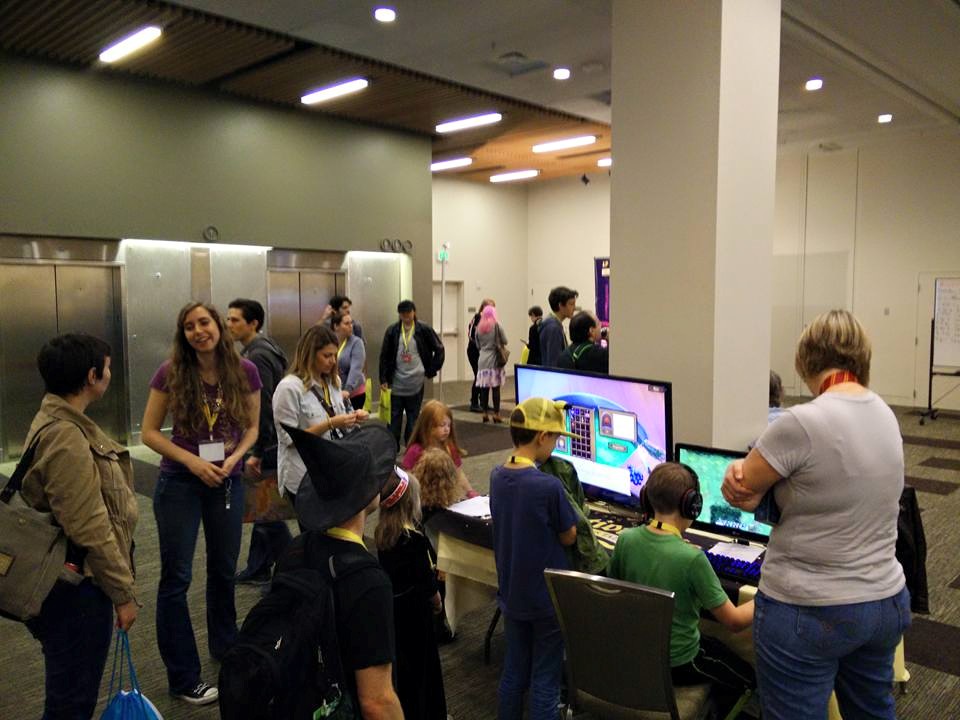My name is Renee.
I am a gamer, game journalist and video game developer, and I have impostor syndrome.

I can admit that, on paper, I can look fairly impressive: I am the CEO and Creative Director of Stumbling Cat, a Seattle based indie game studio that I founded two years ago. I currently lead a team on the development of a game called Potions: A Curious Tale, which we exhibited at PAX Prime, IndieCade, Geek Girl Con and other conventions. I also sit on the Seattle chapter board of IGDA, where I plan events to support local developers. I volunteer as a mentor for students in programming and game development at Foundry10. In my spare time, I am a freelance journalist for the website Broken Joysticks.
I can give you reasons why every single one of those achievements isn’t very impressive. There is a constant struggle in my head between praising myself and demeaning my achievements.
This is not uncommon in the game industry, especially among indie developers. It is a disease that eats at confidence and will power, that fuels anxiety and depression, and that has brought the end of many projects. There is no cure, only temporary treatments for the symptoms until they claw their way back to sit on your chest as you try to sleep at night.
Impostor syndrome is not unique to game developers, we all experience it in little blips throughout our lives. It’s those little moments of self-deprecation and justification for your victories in the back of your mind: “no one else was really trying”, “I just got lucky”, “this doesn’t really mean anything”, “they are just trying to be nice”.
I have read many articles about impostor syndrome recently, some say that those who achieve sudden success suffer from it the most, others talk about it being a force that we all fight. All of these articles have resonated with me to some extent, but have not hit on the main issue that tears away my confidence. There is one issue, one excuse, one justification for my “luck” in my achievements that comes up again and again: I am a woman.
I dislike talking about my gender. Years of participating in online communities and reading anonymous comments about other women and me have made focus on my gender make me feel uneasy. At one point I was bold about it, proudly affirming to my online companions and enemies that, yes. Yes, I am a girl.
Expected reactions ensued, from accusations of “attention-whoring” to proclamations of love. Often there was denial or requests for proof; even sometimes there was almost no reaction at all. At the worst, there was stalking, sexual harassment, and death threats called in to my own personal phone number.

What my gender also brought was the need to prove myself to others: If I was doing well on damage meters in a game, it was because I was gifted better gear until I proved otherwise. If I was ranked highly in a game I was playing with a boyfriend, it was because I was “getting carried”. If I expressed fandom for a geeky subject, I had to prove I wasn’t just in it “for the attention”.
I doubt that these surprise anyone; they are commonly known reactions in online, geek and game communities. However, the issues of gender don’t stop there; I’ve been fighting them for my entire life until they have become internalized in my subconscious. Now, I have to fight against my own doubts stemming from my gender, not just the doubts of others.
In second grade, my teacher was fairly old, with gray hair and a bushy beard. Only when reflecting back upon him many years later did I realize he was likely a pervert, putting the girls in my class over his knee and lightly spanking them on their birthday, one spank for each year they were old. He never spanked me on my birthday, maybe I wasn’t as cute as the other girls, but more likely that the fight my parents had brought to the principal over my education made him wary to test the waters with me.

This teacher had set up a math section of the class that you could complete at your own pace, as long as it was finished by the end of the school year. I loved math, so I devoured and completed the section in the first few weeks of school. I was then told that I didn’t have to do any math for the rest of the school year. As it was my favorite subject, I requested more complex math problems to continue working on, and that’s when he told me that “girls don’t need to know math” and that I knew enough and should be content playing instead.
My career as an engineer, programmer and game developer could have been ended right there.
Luckily, I conveyed this information back to my parents and they took it straight up the chain of command until I was busily working away at basic algebra problems during class time. It had the added benefit of discouraging someone who may have been a pedophile from touching me as well.
This was the first of many fights, both minor and large, that I faced on my path to where I am now.
These hardships that girls face while growing up, especially those who are drawn to math, science and technology, are the reason why encouraging diversity is so important. It is absolutely necessary to give girls extra tools and encouragement to help them combat the times sexism has held them down. However, there is a huge side effect of these helpful actions: impostor syndrome.
I received my degree in Engineering from Harvey Mudd College. Before my freshman year started, we had an orientation. During part of this orientation, the class was divided into two rooms: one for males, one for females. The split was fairly equal, about 46:54, if I recall correctly.

The topics covered were mostly what one would expect: where to acquire condoms and dental dams, where to go for counseling services, and how to use a whistle they provided us with in case of an assault. Then came a talk I hadn’t expected; assurance that we were here because we were intelligent and driven, not just because we were female.
Truthfully, I hadn’t considered my gender to be a major part of the college selection progress, but that talk had the opposite effect as intended, and planted the seed of doubt.
Every time I did poorly on a test, “maybe it’s just because they accepted me to help their gender ratio”. Around me, female classmates dropped out far more regularly than the men. My sophomore year, despite near equal starting gender ratios for each class, I noted the whole school’s ratio was actually 35.6:64.6.
I fought depression, I berated myself for doing so much worse in college when I was a valedictorian back in high school. I lost my appetite and had trouble forcing myself to eat enough. Despite being tall and lean already, I lost ten pounds over my first year of college.
Throughout my life, impostor syndrome had challenged me here and there, causing me doubt and grief, but it wasn’t until this point that it stopped me.
I had fallen in love with computer science and programming. I decided I wanted to switch my major from Engineer to Computer Science. I went into the main office and picked up a major change request form… and I didn’t fill it out.
My doubts consumed me. Impostor syndrome reared up and stopped me from filling out that form, because all of the guys in the program had been programming since high school or before, because my boyfriend at the time was a way better programming than me, because doing well in one intro class didn’t mean I would stand a chance in the high level courses.
I couldn’t escape this gender-fueled impostor syndrome.
Sexism in the technology and game industries rarely appears boldly. Instead, it creeps into unassuming statements like “So you do the art?” when you have made no indication of your role on the team.

Before I managed to switch over to games, I was working in the biotech industry. My company had just hired a new CEO and his new “adviser” was asking a third party company to compare the system my female coworker and I had designed to the older version that had its development halted. Representatives from the third party heard an overview from my coworker and me about why we created the new system, how we architected it and in what ways it was superior to the old system. The third party then asked the adviser why he wanted our system to be reviewed at all, as it seemed fairly apparent to them that our points were valid and that we had a strong grasp of what we were doing. The adviser spluttered out that he was “unsure of [our] work due to [our] age and experience levels.” He never brought up a similar concern for the three younger males at our company, all three of which we had helped hire and were often given instructions to report their findings directly to me.
Of course, this meeting came after we presented the adviser and the CEO the same evidence, complete with graphs, comparisons and even color coded tables to simplify the data, and were told “Ladies, ladies, let’s not get emotional” when presenting this evidence and inquiring why our own experience, data and opinions were being ignored in the decisions being made for our own project.
I haven’t met the same lightly disguised sexism at game industry events yet. However, when talking to people who are very kind and polite to me, I have explained that I do everything on the project but the art and sound and been met with the question “So who does the programming?”.
Questions and comments like those can be brushed off, but they begin to wear you down. I’ve been beaten down by my own doubts and they nip at my heels when someone sneers at me and makes a comment that feeds into my fears. And those have real consequences: I didn’t fill out that form, I didn’t give myself credit for the reactions to my work. I have spent more than an evening choking on tears that I couldn’t share because I was afraid of seeming weak.
Throughout college, my passion for games started to garner attention. I cosplayed, made art, streamed, blogged and ventured out to conventions. I had fans, a strange concept, but… it’s just because I’m a girl, right?

I was asked to join the Seattle chapter board of IGDA, but it was made clear that they were trying to increase the diversity of the board… I probably wouldn’t have been asked to join if I was just a male.
I was able to squeeze into a last minute spot at the Washington Interactive Network booth at PAX Prime, but… maybe they just picked me so they could look more diverse.
It is a real fear of mine that my achievements are because I am a woman, not in spite of it or regardless of it. I wonder if people really find special value in my game development vlogs, as many of them tell me, or if they watch them because I put a pretty face and feminine voice on game programming.
I am in a constant struggle. My gender gives me both advantages and disadvantages, but I don’t want to be defined by it. I want to tell other women about my struggles, I want to encourage girls and let them know what they can do, but I am stuck between being an advocate for my gender and trying not to be defined by my gender.
When I am invited to speak on a game industry panel, I want to be because of my expertise and accomplishments, not the number of X chromosomes that I was born with.
Yet, when I was exhibiting Potions: A Curious Tale at Geek Girl Con and a young girl would be excitedly chatting to her parents about the witch lead character, sometimes even declaring to them, “It’s me!” I was filled with joy. When I took a knee next to them, introduced myself and thanked them for liking my game, I would see their eyes light up. I assured them that, yes, I made the game and that they, too, could make games. Their reactions of hope, excitement and delight brought me to the edge of tears more than once.

Talking to a parent while exhibiting at Geek Girl Con 2015.
Many parents thanked me for talking to their children, one even noted that her daughter loves video games, but was teased by her classmates for liking Minecraft instead of traditional girl toys, and my heart breaks for them. Twenty years later and girls are still starting with the same disadvantages that I did.
I am writing this article for them and for other women in games, both creators and consumers. I am writing it so that they will know that they are not alone, that we all face that struggle, even women with fancy titles like me. And I am writing it so that everyone can better understand the struggles we face, both from others and from within.
I am proud to be a woman in games and I will not let this impostor syndrome stop me again.

